Podcast: Download (Duration: 36:55 — 30.3MB)
Subscribe: Spotify | TuneIn | RSS | More
Once you have a book in the world, translation is one of the ways that you can expand your readership, and potentially your income, through licensing foreign rights.
Of course, as indie authors, we can reach a global audience through self-publishing our books and many indie authors are moving into publishing in different languages. Some are successful, others not so much.
In this episode, I explain my first experiences with translation in 2014, why I withdrew my books in 2017 and why I have now published 3 books in German in the hope it will help you make some decisions about your own creative work.
My first attempt at translation in 2014 … and why I pulled out of the market
As ever, I am often early with my independent author experiments!
Back in 2014, I got excited about the possibility of translations. I did two novels in German, Spanish, and Italian. I did royalty share deals with translators and did a digital-only deal with Ullstein-Midnight in Germany. I put the books out on Amazon in ebook and print with much excitement …
I did some Facebook ads and tried some email blasts with early services in those markets but … tumbleweed. Very few sales, even for the book with a traditional publisher.

Several things were wrong with this approach:
- You really need at least 3 books in a niche or series to make investment worthwhile and so that you can make more money per customer. It's very hard to market anything without at least 3 books — which is what I would say to any author in English as well.
- Readers in those language markets are still primarily physical bookstore based, and online sales had not taken off in 2014. They still aren't mainstream even now!
- I spread myself too thin and was not able to market effectively in any language, plus there were no easy options for reaching readers in those markets.
In 2017, I gave up and pulled my books out of the market. I paid off the translators, so I lost money, plus I was disappointed and burned from spending too much time on a project that ultimately failed. After 3 years, I asked for my rights back from the German publisher as they also weren't selling enough to make it worthwhile.
Click here for interviews with my translators and thoughts on my original translation experiences.
Why I decided to try again with German translations in 2019
Every year, I do a report on my book sales and this year, I was surprised to find at 7% of my book sales income came from Germany — for non-fiction books in English!
So I decided there was clearly a market I could serve.

Self-publishing in Germany has started to really take off in the last couple of years, and readers have also begun to buy more books online. At Frankfurt Book Fair, I saw booths of empowered indie authors in the romance and fantasy niches talking to excited fans — and those genre writers are usually the forefront of things to come.
I looked at my top-selling non-fiction books in Germany and then picked the three shortest ones since that would give me marketing ability and cost the least in terms of translation. Basically, this is the lowest risk option for me at this time given my experience last time around.
This addresses the 3 main issues I had last time as this time around:
- I published 3 books in a niche giving me more potential for cross-selling and more income per customer
- Online sales have taken off in the country and I have proven sales in the English language for self-publishing authors
- KDP Select + Amazon ads allow me to market even without knowing the language
Why and how I used AI translation tool, Deepl, to create the first draft
Back in July, I did a whole podcast episode on 9 Ways That Artificial Intelligence (AI) will Disrupt Authors and the Publishing Industry in the Next 10 Years. The advances in AI translation were one of those ways and as part of my research, I looked at a number of companies.
Some of the most advanced were only taking on big accounts, but Deepl came highly recommended from a German bi-lingual friend. It is only EUR7.99 (around US$9) a month with a free 30-day trial and importantly, the copyright for the translation belongs to the owner of the document.
This is super important for German, in particular, because in Germany, the translator can have the copyright to the translation. But if the first draft belongs to you, then any further translation is editing of an initial draft so the copyright remains with the author. Since control of intellectual property is a critical part of the author business, this was attractive!
I recommend at least trying Deepl.com with one of your books, just to see how it works, and particularly if you are bi-lingual in one of the languages they support.
Upload the book and within 1 minute — yes, 1 minute! — it is translated into German, or whatever language you choose. You can do 5 documents (books) per month for EUR7.99 (around US$9), so less than a coffee for a whole translated book.
Most people I asked about the various language translations said it was 70-80% reasonable, and certainly understandable.
[NOTE: This is non-fiction only! I have not tried it for fiction because there are many more ramifications of language in fiction.]
If you are a translator, this tool could help with your workflow. It's like a first draft so it should save you time. I believe that AI translation will GROW work for translators, not replace it. Many more authors and publishers will do translations if it becomes cheaper and quicker to do so, but they will still need localization and editing to produce a finished manuscript.
Turning the first draft into a finished manuscript … in another language!
Of course, a first draft is not a finished work that you can publish and expect to get good reviews. I engaged several different editors who were also translators as well as a team of German-speaking beta readers from The Creative Penn community, and this stage took much longer than I expected.
The first hurdle was the use of ‘Sie' and ‘du.' In English, we have ‘you' but in German, and many other languages, there are different words for ‘you.' In this case, ‘Sie' is for a more formal occasion when you don't know someone, and ‘Du' is for informal friendship usage. The associated words in a sentence also change form based on the choice so it is not a find and replace job.
Deepl didn't translate every occurrence in the same way, so we had to make a decision. We did the first book with ‘Sie' but my beta readers said it just didn't sound like me, so we went with ‘du,' and I'm happy with the result because my beta readers are happy! Apparently ‘du' is more common in the self-help niche and used by bloggers.
In terms of the editor-translators, they still need experience with the non-fiction niche in order to translate specific words and also to ‘localize' the content.
For example, Erfolgreich als Self-Publisher (Successful Self-Publishing) has a whole load of resources that are different for the German market. I couldn't have done that without my wonderful German editor (whose info I am deliberately not sharing as she is on maternity leave. If she returns to work, I will update this article!)
Why I am starting out with KDP Select and Amazon exclusivity for German ebooks
I am a vocal supporter of wide publishing — when authors have at least 3 books in a series (fiction or non-fiction) and they have the time and knowledge to market more widely. It takes a few books before an author is ready to think about different kinds of publishing and book marketing, so it makes sense to start with Amazon. Plus, we also have the most extensive opportunities for English language books, and many of those opportunities are not available in other countries and languages.
My wide publishing for English language is based on the fact that I do global marketing for an English language audience. My podcast has been downloaded in 218 countries, and this site has a global reach, as well as social media being available everywhere. I want readers in all those countries to be able to buy my books, or borrow them from libraries, so wide publishing is best for what I want to achieve as an author and business-woman with a long-term mindset.
BUT/ I do not have a platform in German, I don't speak German, I don't actively market in German (other than on Amazon), and the opportunities for German language publishing and book marketing are not as extensive as in English.
So, I am starting out with Amazon KDP Select for ebooks in order to take advantage of some of the marketing opportunities that do not require language to use. I will also start with Audible exclusivity once I can get an audiobook done for Mindset. ACX is not available in Germany at the time of writing this, so the pool of narrators is much smaller. Hopefully, this will change in 2020.
I may revisit this over time, but the other ebook retailer, Tolino (which you can reach through the aggregators Draft2Digital and PublishDrive) does not have the type of promotional capability as Amazon. Some indies I met at Frankfurt said that it was harder for them to market on Tolino, which means it would be even more difficult for me!
Ingram does have print partnerships in Germany, so I will look at that next.
Book marketing in German — when you don't speak the language!
In October 2019, Amazon KDP added amazon.de to the KDP Dashboard so we can now use Amazon Advertising for books in Germany, Austria, Switzerland and anyone else who shops on the DE store. Go into the KDP Dashboard and click Promote and Advertise. Then choose the store you want to advertise to.
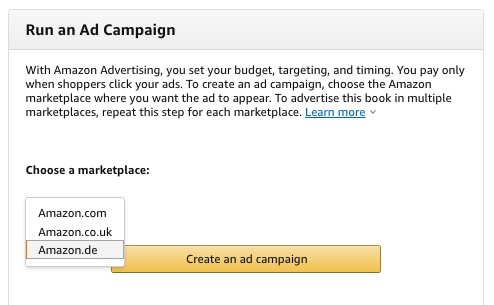
I have around 400 subscribers to my email list in Germany, Austria and Switzerland, so I emailed them on launch and I made advanced review copies available. I will also be doing some Facebook Ads targeted to authors in those countries who have an interest in self-publishing.
I have a few interviews booked on German podcasts, but of course, I will be speaking English!
My thoughts on translation and rights licensing, AI and the future
So, was it worth doing?
I'll give these books a year in order to make a financial return. It was cheaper to get the initial translation done with Deepl, but it still cost for the editing, extra formatting help, marketing and mostly, my time in managing the whole process. It was more ‘expensive' than expected and took a lot more time than I had planned.
I was frustrated by the lack of control because I couldn't even fix a stray typo or get the formatting right on Vellum because I don't speak the language. I also can't do much in the way of marketing, so it's not like going indie in English anyway.
I think it's worth doing translation projects if you have evergreen books that you want to invest in for the long term — and if you can invest the time, and have a marketing angle. But it's best done if you are bi-lingual or can partner with other authors/self-publishers to help do the parts of the process that need language + niche knowledge.
I also think we are in a period of 5-10 years where rights licensing is going to continue as-is for foreign languages, but I do believe that in the 2030s, we will be using wearables that translate automatically.
Neural Machine Translation (NMT) is an expanding area, with Google recently introducing a model with 103 languages trained on 25 billion examples [Synced Review] AI translation earbuds have been released by a number of companies [Today Online].
Many of us already use Google Lens to translate signs, menus and other written text while traveling [TechCrunch]. AI translation is developing at great speed and it's inevitable that disruption will come to the translation industry because of this.
In a similar way to AI audio and voice synth technology, I think translation will split into different segments for rights licensing. People will want to consume cheaper books and won't mind AI-translation for a more affordable product, but there will always be a market for artisanal, human-translated, artistic works.
Of course, that doesn't solve the marketing problem! As we all know, just because you have a book available, doesn't mean you can sell any copies.
All of this makes me want to continue to pursue licensing deals for translation rather than doing it myself. I have non-fiction books in French, licensed through Club Positif, and also in Korean, and will pursue more of these deals through Curl Up Press.
If you are interested in licensing any of my books, please contact me here.
Other resources for translation and rights licensing
If you're interested in translation for your books, check out the resources below:
- 12 Book Translation Tips for Authors
- Translators Base – a site for finding freelance translators and posting jobs you have available
- Book translation services and helpful hints: Kindlepreneur.com/book-translation/
- The Alliance of Independent Authors is running a Translation Rights Program and sharing their lessons learned on a series of videos so you can follow along with the experiment. You can find more info at selfpublishingadvice.org/indierights
- My experiences of translation, interviews with my translators and more
- My discussion with Orna Ross about translation into German on the Ask ALLi Podcast – Nov 2019
- Interview with me on the Vienna Authors Podcast with Klaudia Zotsmann-Koch
- Interview with me on Selfpublisher Podcast with Henri Apell
Bücher in Deutscher Sprache
 |
 |
 |
Do you have experience in translation as an independent author?
Are you a translator with thoughts on what we could improve or what could work for indies?
Please join the conversation by leaving a comment below.
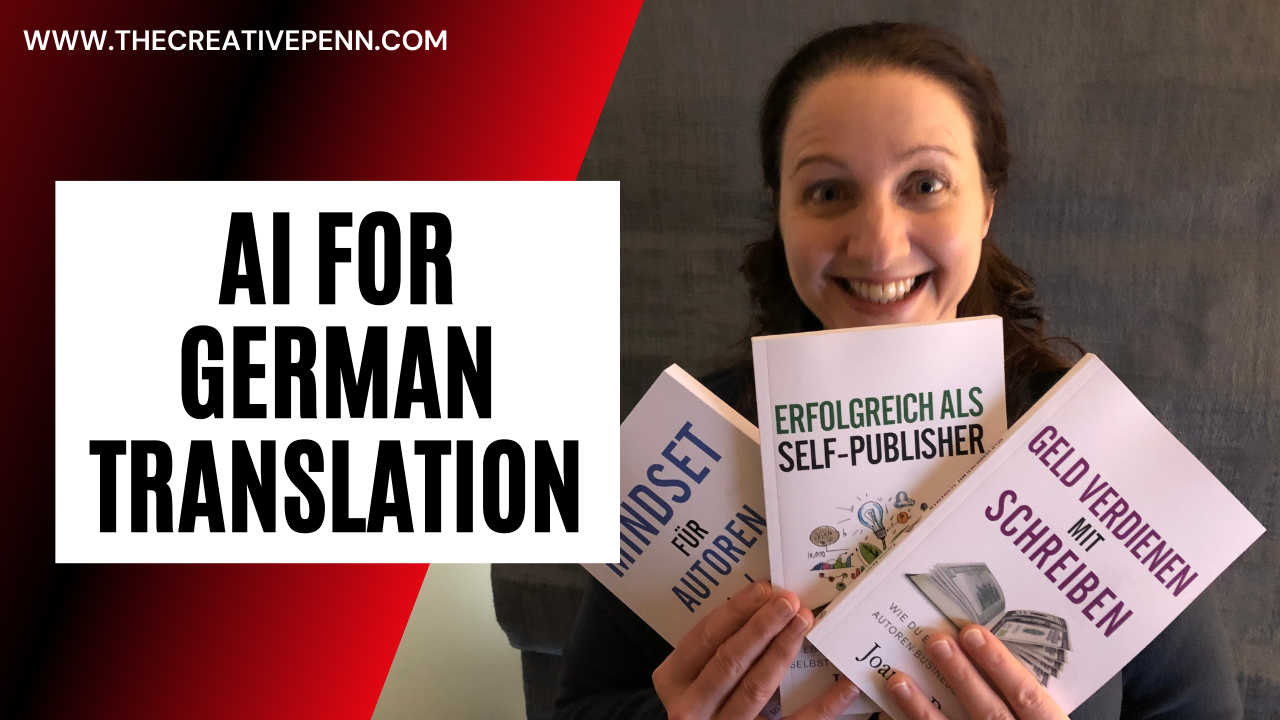
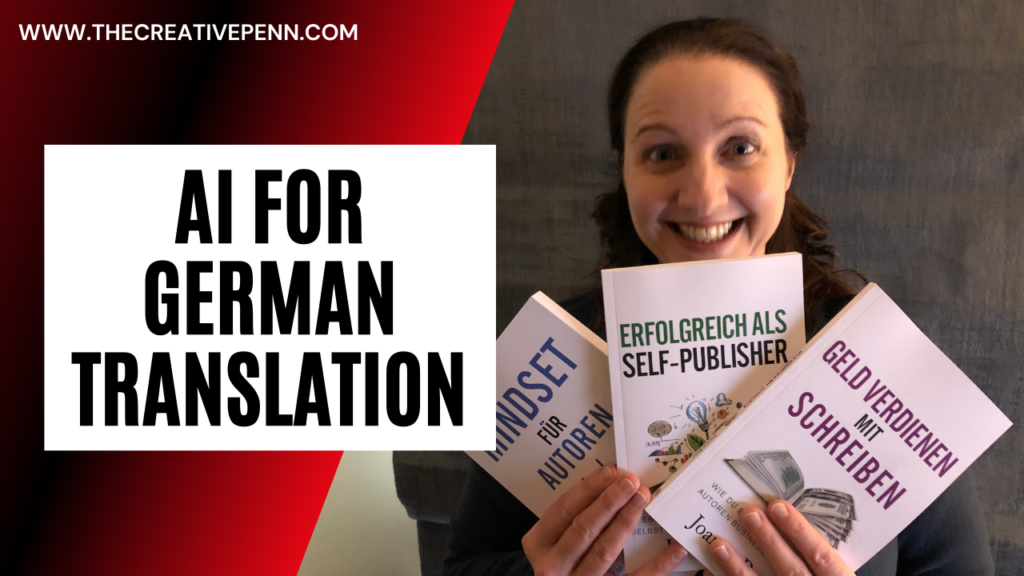
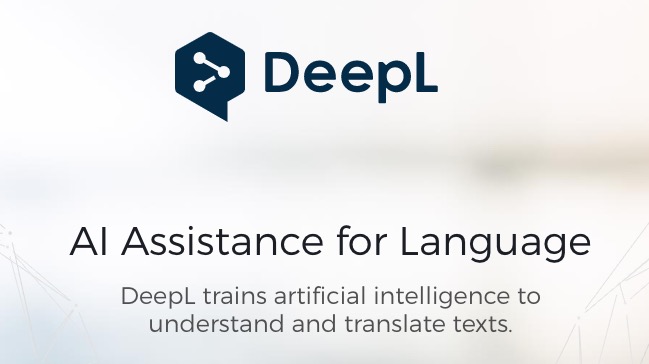
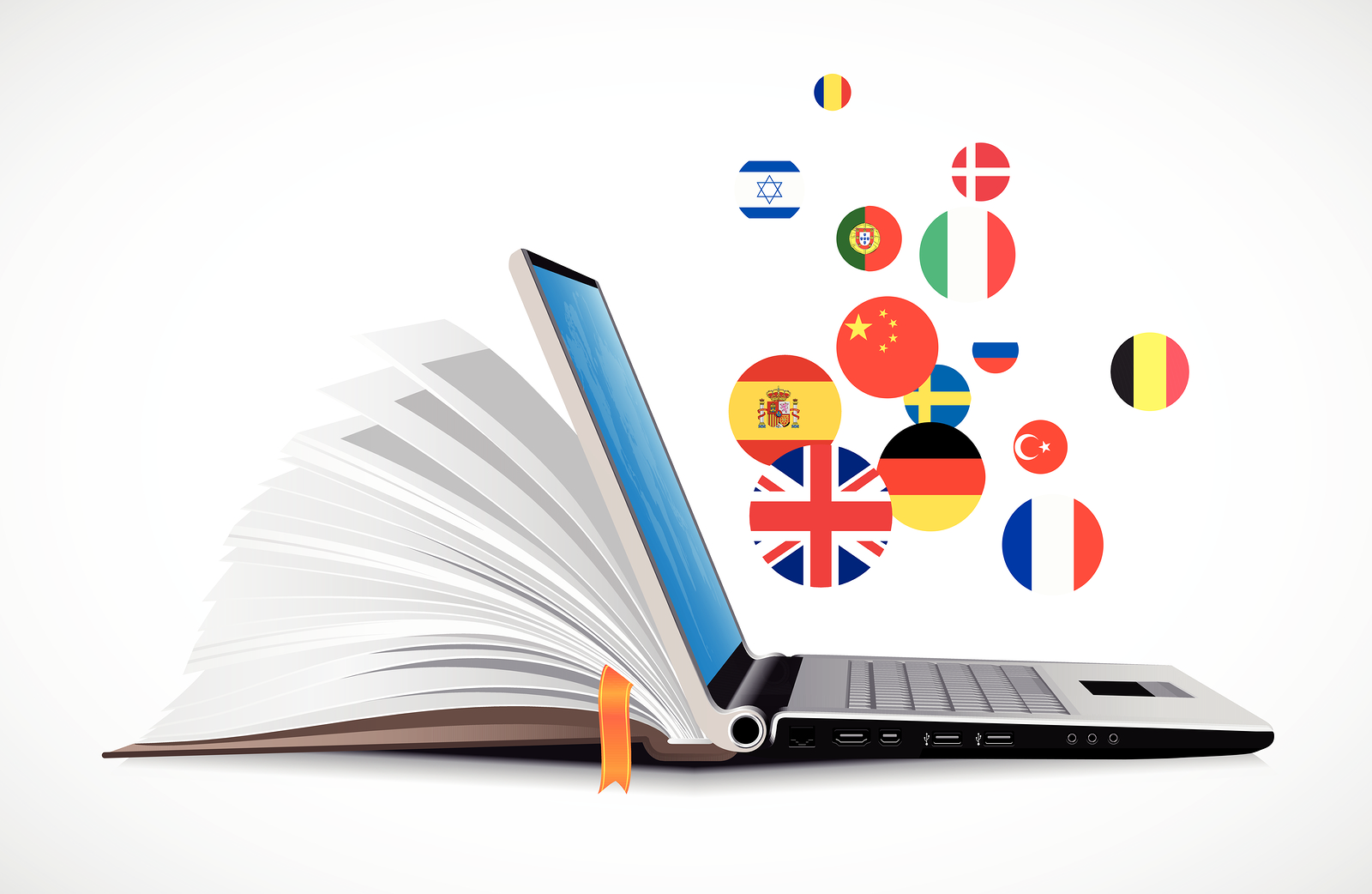



Such a great show!!! I am so incredibly excited about your adventures in AI! This is an area I don’t know much about, but I can see how beneficial the technology could be for writers. Thank you for taking the plunge and sharing your experiences with us.
Hi Joanna. Thanks for another most informative article.
I hired someone to translate one of my books into Spanish in 2014. I found him through a freelance organisation. I sold zero copies. Even without a word of Spanish myself, I discovered many mistakes in the text. I suspect my translator used Google Translate. Not a success.
Joanna, I love your conversations about AI. So informative and exciting. Just fyi–I went to iTunes to download Google Lens and got a message that it wasn’t available for my country (USA). Bummer! I’ll keep an eye out for it. Thanks.
Glad you like AI 🙂 Google Lens is just part of Google search, you don’t need to download anything. If you use the Google app on your phone, the search bar has a little icon, like a square with a dot in the middle. That is lens. Point it at something like a flower and it will tell you what it is, or use it on a sign in a foreign language.
Google Translate is an app you can download. You’ll definitely have that in the App Store 🙂
Really interesting and informative. I’m including this in this week’s Notes for Writers email (https://notesforwriters.substack.com/).
This post reminds me of when I used to be a technical author. On a course I met a Scot who worked in Japan for a company that translated user manuals of Sony, Sanyo etc. for the UK and USA market. The manuals were translated by English speaking Japanese into English and then sent to my colleague’s company in Tokyo. He called these translations Jinglish because they were still full of errors. His job was to iron out all the errors and make any changes necessary for proper English speakers.
Anyone old enough will remember the days when we used to buy stuff made in places like Japan and the English version of the user manuals were so bad they were funny, except when they were dangerous. Luckily computers with English (US) operating systems have meant that English has become more predominant. Although a lot of stuff is made in China today and they have rather a lot of people so that may affect the dominance of English in the future.
Great podcast.
I see you have published in French.
What do you think of this market ?
Those books are licensed to another publisher. They are not self-published. I’m happy with the royalties I get and now Amazon Advertising has opened up there, it will be interesting to see how it goes. The French market is way behind right now in terms of digital sales.
Hi Joanna, a while back you mentioned an online AI service that will translate your text into a human voice of your choice (french, german etc.) for only a few Euros. I have scoured your site but can’t find a mention or link. Could you possibly comment it here?
Thank you.
Marc
Hi Marc,
Translation is one thing – and as per this article, http://www.deepl.com is a translation engine – that also just got a whole lot better – https://www.deepl.com/blog/20200206.html
In terms of voice, there are a lot of options now – Amazon Polly https://www.thecreativepenn.com/2019/05/17/how-to-turn-your-book-into-a-podcast/
and also Google Cloud https://cloud.google.com/text-to-speech as well as IBM Watson https://www.ibm.com/cloud/watson-text-to-speech and many others.
Hi Joanna, some great tips here. This is indeed an amazing idea of publishing the book in the different languages which will not only increase the popularity of the author but will also help in boosting sales and earnings.
This is the most informative and amazing post I’ve read in a while. I guess after reading this, anyone can get inspired to deal better with german Ai related things. Each and every word is so honest and encouraging. Thank you for sharing this with everyone .